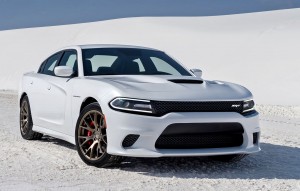Dodge is spreading the word that some of its own dealers may be cheating Dodge customers. It’s what you might call a head-scratcher of an ethics problem. Are Dodge Dealers losing their ethical center?
In an article for CNN Money (March 3, 2015) by writer Chris Isidore, we learn:

2015 Dodge Charger SRT Hellcat.
“Dodge said the dealers are possibly doing something unethical and illegal…a ‘small number” of dealers are taking multiple deposits for the 2015 Dodge Challenger and Charger SRT Hellcat models, even though their customers might have to wait months for their cars, if they get them at all.”
The dealers are taking more deposits on more of the desired models of cars than they can deliver. Dealers have something called an allocation system; in the case of a very desirable model, such as the new Hellcat, there are only so many to go around – and the dealers know it. If I am only allocated 15, and I take deposits on 50, it sets up all kinds of problems. Could it set up “bait and switch” scenarios? Possibly. How about competitive bidding situations on top of the retail price? It is certainly within the realm of possibility. In the very least, it enables an unscrupulous dealer to hold onto tens of thousands of dollars of customer’s money that could then be invested in short-term financial instruments.
“Dodge said the dealers who are improperly taking more orders than they can deliver are causing a customer relations issue. But the automaker didn’t identify the dealers, and spokeswoman Kristin Starnes could not immediately say if the automaker will take any steps against them.”
So what’s the point?
I did a little online research and found there are about 3,000 Dodge dealerships in the United States. Dodge says a “small number” are essentially scamming people but I have no idea what a small number may be. Is it 100 dealerships? That’s only about 3 percent, but it could represent hundreds of thousands of dollars. Suppose its 300 dealerships? Now we’re potentially talking millions of dollars.
To make matters worse, Dodge won’t identify the dealers nor will they take any steps against them? Isn’t that called “being complicit?”
You would think the opposite set of ethics would be in place. It wasn’t all that long ago that Detroit was getting ready to put out the “Going out of Business” signs. Dodge was not exactly in great shape; that is why Fiat now owns them
Dodge has apparently developed a couple of hot car models and America has re-discovered the company. Is this how the dealers are rewarding them? At a time when Dodge should be doing everything in their power to encourage their long-lost customers to return, they are driving them away with this kind of nonsense.
Not helpless
The parent company has become part of the problem. In generally ignoring the situation, they become partners in the scam. They could act immediately by reigning in the “small percentage” of dealers. They can bring about penalties and sanctions, and if worse came to worse, they could identify the culprits. They aren’t doing so.
Perhaps they feel as though the hype and thrill created by the great demand for the 2015 Dodge Challenger and Charger SRT Hellcat’s are worth the negative articles. I am here to say that the long term effects of poor ethics will outlast the hype. It always does.
The situation occurred in the first place because the Dodge Company has failed to institute strong ethical guidelines to prevent such a scam from happening. As long as Dodge has been in business, they apparently have little control over its individual dealerships. This is not all that surprising to me. I am often astonished by how long established companies, decades old companies, have never bothered to establish a strong ethical core.
There was a time when ethically, it was always customer beware. The landscape has dramatically shifted with the rise of the social media and the internet in general. Customers are free to debate the merits of the Charger SRT Hellcat all they want; that’s part of the game. However, the landscape of debate shifts dramatically if a company is caught scamming its customers. Now the scene shifts to one of company beware.
The social media cannot be easily bought off; negative ratings and negative impressions exist in their own sphere. Unless Dodge begins to take immediate ethical steps to correct this type of situation, I can promise that it will get worse, not better for them. They must start at their ethical core, and they must immediately do so.


